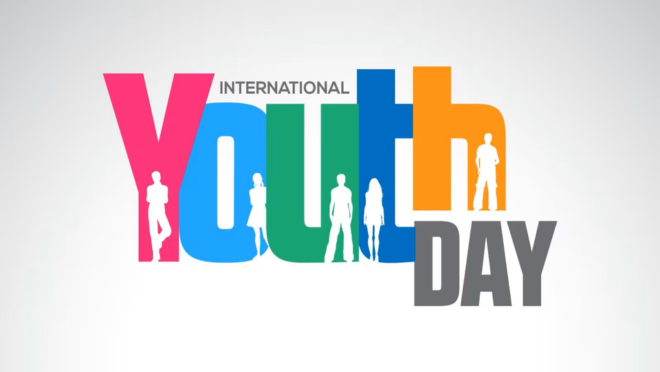International Youth Day 2025: Empowering youth for a sustainable future
International Youth Day 2025: Empowering youth for a sustainable future

International Youth Day (IYD), observed annually on 12 August, was first designated by the United Nations in 1999 following a recommendation from the World Conference of Ministers Responsible for Youth in Lisbon, Portugal. This day is dedicated to recognising the immense potential of young people and addressing the challenges they face.
The inaugural celebration took place in 2000, creating a platform to highlight youth-related cultural, legal, and socio-economic issues worldwide.
Each year, the UN selects a theme to raise awareness of pressing issues. Past themes have ranged from “Youth and Mental Health” (2014) and “Transforming Education” (2019) to last year’s “From Clicks to Progress: Youth Digital Pathways for Sustainable Development” (2024). This year’s theme—Local Youth Actions for the SDGs and Beyond—underscores the need for partnerships and technology-driven cooperation to achieve sustainable development goals (SDGs).
The UN’s official commemoration this year will be held in Nairobi, Kenya, featuring interactive dialogues, a Youth Innovation Showcase, and discussions on the role of youth in achieving the SDGs.
National Focus: Loans, Training, and Recognition
This year’s local theme — “Youth Advancing Multilateral Cooperation, Through Technology and Partnership”—reflects the global focus on equipping young people with the tools and opportunities to contribute meaningfully to local and international development goals.
The Department of Youth Development (DYD) has announced that Tk47.26 crore in youth loans will be disbursed to 4,985 recipients across the country as part of this year’s commemorations. The initiative aims to bolster self-employment, entrepreneurship, and skills development, reinforcing the government’s commitment to transforming the country’s youth into a driving force for sustainable growth.
In Bangladesh, the central event is set to inaugurate at 10:00am at Hotel InterContinental Dhaka, where the National Youth Awards will also be presented. Awards will recognise excellence in youth activities at both the national and divisional levels, with special honours for individuals from ethnic minority communities, transgender groups, and persons with disabilities.
The DYD’s loan disbursement initiative aligns with broader government programmes to nurture human capital. Each year, around 200,000 youth benefit from modern, science-based technical training followed by financial and material support.
To address the needs of those outside formal education or training systems, the EARN project is working to create employment opportunities for 900,000 unemployed youth. The DYD is also investing in freelancing training in all 64 districts, eco-friendly biogas plants, and mobile computer training centres in remote areas. In the past year alone, 271,719 young people aged 18 to 35 have been trained in various trades, while 1,076 received training in traffic management and public awareness to support law enforcement.
The larger picture: Why it matters
Globally, youth — defined by the UN as individuals aged 15 to 24 — make up roughly one-sixth of the world’s population. Yet challenges remain stark. According to UN statistics:
- 21.78% of youth worldwide in 2025 are NEETs (Not in Education, Employment, or Training).
- Women make up over two-thirds of the world’s illiterate population.
- Mental health issues affect around 20% of young people each year.
- Many young workers remain below the poverty line despite full-time labour, with the ILO estimating 152 million such workers globally.
In developing countries, two-thirds of young people are not realising their economic potential — a sobering reality that underscores the urgency of investment in youth skills, health, and opportunities.
Celebration beyond ceremonies
While official events and award ceremonies take centre stage, International Youth Day’s impact extends to grassroots participation. Youth organisations, NGOs, and educational institutions across Bangladesh will host workshops, cultural performances, exhibitions, and panel discussions.
The day also offers a chance for citizens to engage directly — whether by mentoring young people, promoting awareness on social media, or supporting community-based initiatives. “Helping hands are not always about money,” notes one DYD official. “Guidance, mentorship, and motivation can be just as transformative.”
Looking back at the journey
The roots of International Youth Day date back to 1965, when the UN first began addressing youth issues through declarations promoting peace, respect, and mutual understanding. The idea for an annual observance emerged from the 1998 Lisbon conference, and by 17 December, 1999, the UN General Assembly had adopted the resolution establishing 12 August as International Youth Day.
Over the years, the observance has grown from a symbolic occasion to a global movement, connecting youth-led initiatives to policy discussions, and bridging local actions with international frameworks like the SDGs.
Technology, partnership, and the post-July Context
This year’s celebration in Bangladesh comes against the backdrop of the post-July Mass Uprising, a period that has reignited national conversations about the role of youth in shaping the country’s future. The DYD has emphasised its focus on transforming technology-driven youth activism into tangible economic and social gains.
Skill-based training, self-employment loans, and service-oriented activities are seen as key pathways to ensure that youthful energy and digital literacy translate into sustainable livelihoods and community development.
Marking the occasion
To commemorate the day, the DYD will release several publications, including its annual report, a souvenir, brochures, posters, and a booklet highlighting the achievements of National Youth Award winners. These materials aim to inspire and inform both policymakers and the public about the scope and impact of youth-driven initiatives.


